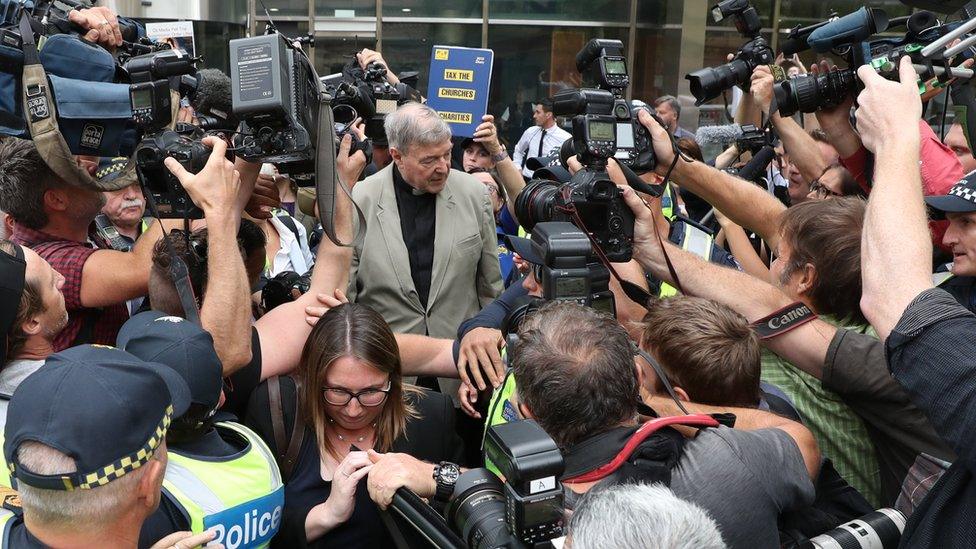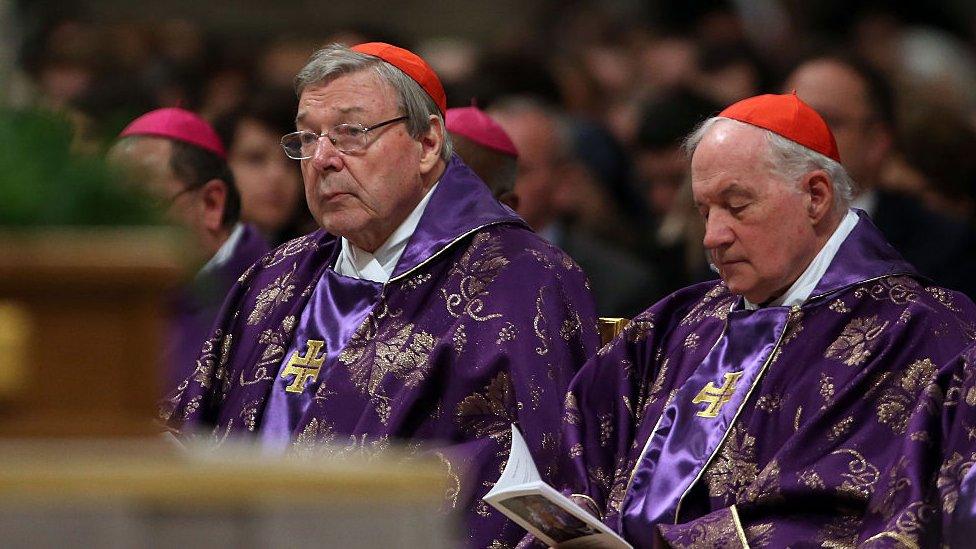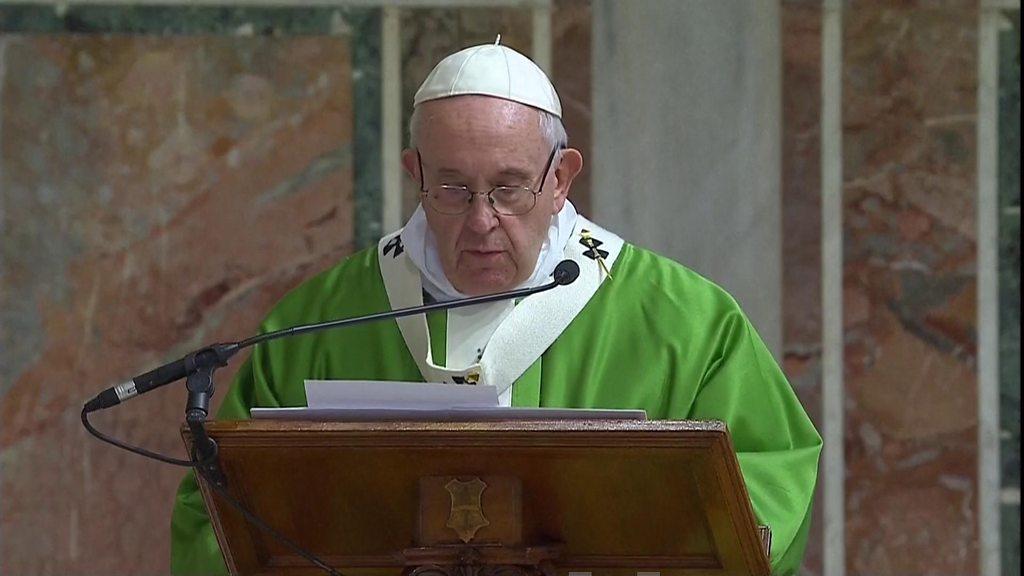George Pell: Cardinal found guilty of sexual offences in Australia
- Published
George Pell is the most senior Catholic cleric to be convicted of such crimes
Cardinal George Pell has been found guilty in Australia of sexual offences against children, making him the highest-ranking Catholic figure to receive such a conviction.
Pell abused two choir boys in Melbourne's cathedral in 1996, a jury found. He had pleaded not guilty.
As Vatican treasurer, the 77-year-old Australian was widely seen as the Church's third most powerful official.
Pell, due to face sentencing hearings from Wednesday, has lodged an appeal.
His trial was heard twice last year because a first jury failed to reach a verdict. A second jury unanimously convicted him of one charge of sexually penetrating a child under 16, and four counts of committing an indecent act on a child under 16.
The verdict was handed down in December, but it could not be reported until now for legal reasons.
Pell was swarmed by media and heckled by onlookers as he left a court on Tuesday.
The Vatican later confirmed that Pell was prohibited from public ministry, and had been banned from having contact with minors. He has to abide by these rules until any appeal is over.
They added that while the ruling was "painful", and the Church has the "utmost respect" for the Australian authorities, Pell has the right to "defend himself to the last degree".
The Catholic Church worldwide has in recent years faced a damaging series of allegations relating to sex abuse by priests, and claims that these cases were covered up.
Pope Francis has just held an unprecedented summit on paedophilia in the Church.
What did the court hear?
Pell was archbishop of Melbourne in 1996 when he found the two 13-year-old boys in cathedral rooms following a mass, the County Court of Victoria was told.
After telling them they were in trouble for drinking communion wine, Pell forced each boy into indecent acts, prosecutors said. He abused one of the boys again in 1997.

Pell was swarmed by media as he left court on Tuesday
The court heard testimony from one of the victims. The other died of a drug overdose in 2014.
A jury rejected an argument by Pell's lawyer, Robert Richter QC, that the allegations were fantasies contrived by the victims.
What has been the reaction?
In a statement on Tuesday, Pell's surviving victim - who cannot be named - called the case stressful and "not over yet".
The man said he had experienced "shame, loneliness, depression and struggle" because of the abuse.
"Like many survivors it has taken me years to understand the impact upon my life," he said.
The Australian Catholic Bishops Conference said the conviction had "shocked many across Australia and around the world", reiterating its vow to make the Church "a safe place for all".
Abuse survivor groups welcomed the verdict.
The Vatican said the ruling was "painful", but added that Pell had the right to "defend himself to the last degree".
"We reiterate the utmost respect for Australian judicial authorities," spokesman Alessandro Gisotti said in a statement, which he read out in a press conference.
"In the name of this respect, we now await the outcome of the appeal process."
He added that "Cardinal Pell has reaffirmed his innocence and has the right to defend himself to the last degree".
"It is painful news that, we are well aware, has shocked many people, not just in Australia," he added. "As we await the definitive verdict, we join the Australian bishops in praying for all victims of abuse, reaffirming our commitment to do everything possible so that the Church is a safe home for everyone, especially for children."
What has Pell said?
"Cardinal George Pell has always maintained his innocence and continues to do so," read a statement issued on his behalf on Tuesday.

Pell (l) was considered one of the Pope's closest advisers
Pell would await the outcome of his appeal, the brief note read.
Why was the case kept secret?
Last May, a judge handed down a legal order which prevented any reporting of Pell's trial and conviction.
It was designed to prevent a separate trial - which will no longer go ahead - from being influenced by the first trial.
The abandoned trial was to hear unrelated allegations - strongly denied by Pell - that he had indecently assaulted boys in the 1970s. Prosecutors withdrew their case on Tuesday, citing insufficient evidence.
The collapse of the second trial led to the lifting of the publication ban.

Cardinal 'didn't flinch' in court
Hywel Griffith, BBC News Australia correspondent
George Pell would sit in the dock with his notebook, listening, writing, but never really betraying any emotion.
As the court heard vivid descriptions of how in 1996 he had forced himself upon two victims, pushing his archbishop's robes to one side in order to expose himself, he didn't flinch.
After two trials, one hung jury and many months of waiting, the results of this long process are now public.
The pace of justice has felt slow at times, but it has resulted in one of the Church's most prominent figures being held to account.

Who is Pell?
The Australian cleric rose in prominence as a strong supporter of traditional Catholic values, often taking conservative views and advocating for priestly celibacy.
He was summoned to Rome in 2014 to clean up the Vatican's finances, and was often described as the Church's third-ranked official.
Pell's early court hearings drew enormous interest
But his career has been dogged first by claims that he covered up child sexual abuse by priests, and then later that he was himself an abuser.
Pell was demoted from the Pope's inner circle in December. His term as Vatican treasurer expired on Sunday.
What is the wider picture?
The sexual abuse of children was rarely discussed in public before the 1970s, and it was not until the 1980s that the first cases of molestation by priests came to light, in the US and Canada.
In the decades since, evidence of widespread abuse has emerged globally. In Australia, an inquiry heard that 7% of the nation's Catholic priests had abused children.
Pope Francis has established a committee to tackle sexual abuses. In recent days, he has promised concrete action, calling clergy guilty of abuse "tools of Satan".
But critics say he could do more to combat paedophiles and those who conceal abuse.
- Published24 February 2019
